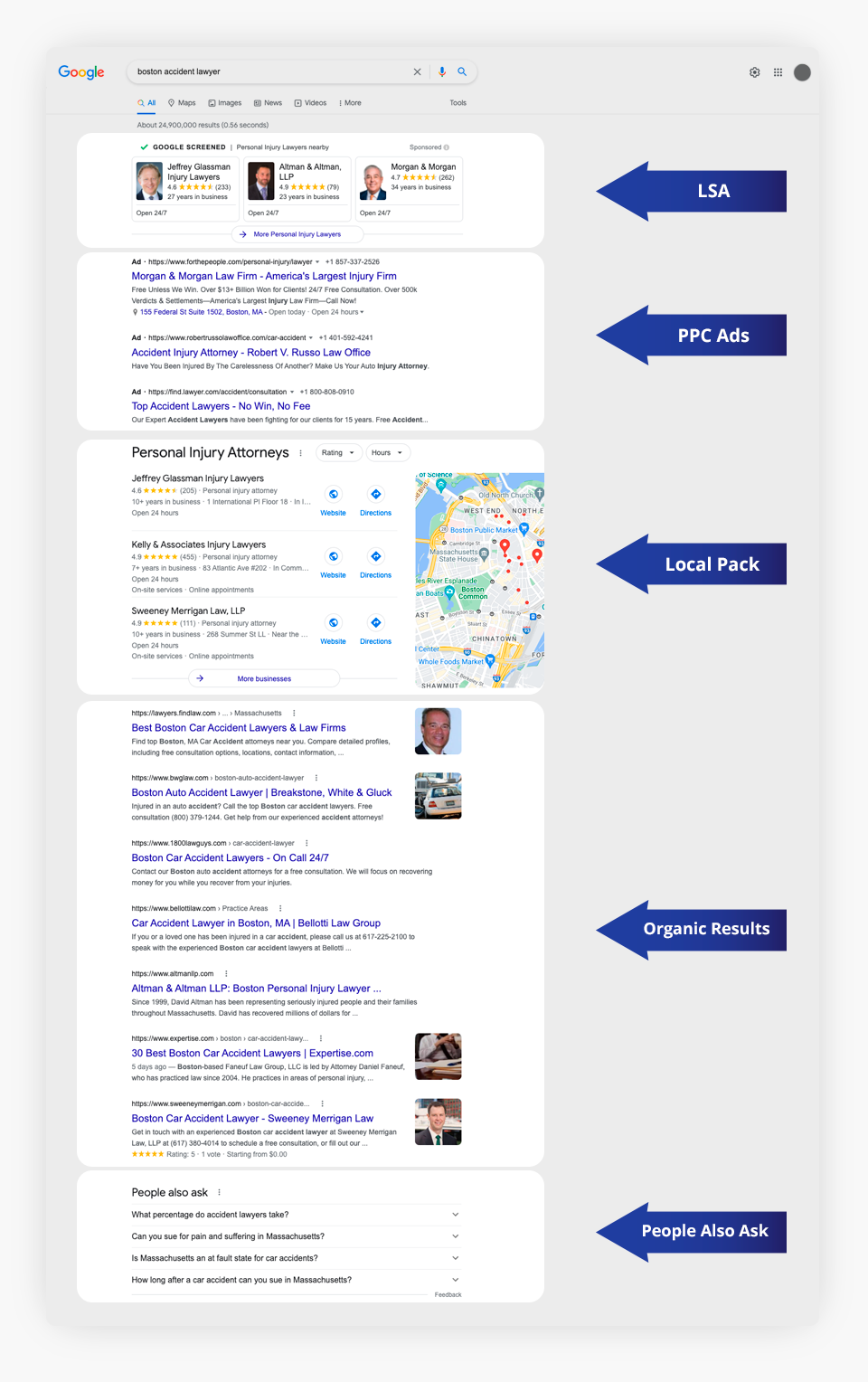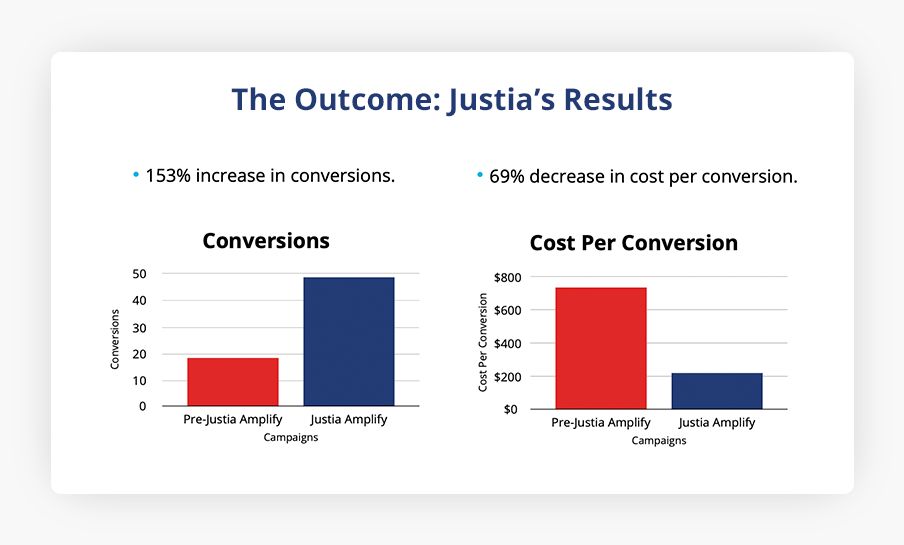We can’t send you updates from Justia Onward without your email.
Unsubscribe at any time.
Pay-per-click (PPC) ads are a great way for lawyers to target potential clients searching for an attorney. However, PPC myths also run rampant online. Check this post out to learn more about some common PPC myths and misinformation that should make lawyers think twice.
The internet is one of the most powerful tools available in the modern age. It places key information directly at your fingertips. From helping people stay up to date on current events to discovering new entertainment options and exploring new topics, the internet offers a wealth of knowledge for users, but it is also home to many conspiracy theories and plenty of misinformation.
Occurrences of misinformation online are so well-known that they have even become the topic of amusing commercials. In a rapidly changing field, such as PPC advertising (and especially with Google Ads PPC), it is only natural that misunderstandings will occur and misinformation will be perpetuated into common myths.
Related Post: Lawyers Beware: 6 Common SEO Myths, Some of Which May Be Partially True
Unfortunately, falling for some common PPC advertising myths can also have a detrimental impact on a search engine marketing strategy. To help lawyers avoid this outcome, we are here to dispel four of the most common myths our Justia Amplify team routinely encounters in the Google Ads realm.
Watch this Justia Webinar playlist on YouTube.
1. I Don’t Need PPC Ads If I Have a Strong SEO Strategy and Good Organic Visibility
Google undoubtedly commands the global search engine market with a huge market share. The Google search engine results pages (SERP) for the basic lawyer and legal services search terms are dominated by ads, which in turn pushes the organic search results lower on the page. This is especially true for mobile devices, where the first organic search results might not even show up until one has scrolled past many ads.
While organic search still works great for long-tail search terms and frequently asked questions, basic lawyer service search terms (such as “criminal lawyer” or “estate planning attorney”) increasingly require lawyers to leverage Google Local Services Ads (LSAs) and PPC ads to increase their visibility and reach more clients.
Several changes have increased the number of clicks on advertising placements on Google’s SERP in recent years.

First, searchers are seeing more ads, as Google has increased the maximum number of ads on its search result pages from two to four. Google has also added various extension options to its text ads on the Search Network that increase the vertical height of ads (especially the first two ad placements), such as sitelinks, callouts, call extensions (phone numbers), and location extensions (nearest location to the user), among others.
Additionally, Google Ads have increasingly been made to look like organic results and the organic results look more and more like ads. Even more recently, Google added Local Services Ads (LSAs) for law firms above the standard Google Ads PPC placements.
Finally, mobile device usage has continuously increased and mobile traffic makes up the majority of Google searches. In turn, Google LSAs and Google Ads are now taking over more screens well before someone may see an organic search result.
With this arrangement of information, many searchers will see multiple law firm ads before they even reach the first organic search result. Even if a potential client contacts your firm by way of your organic search result listing, they may have also already contacted several other firms utilizing PPC ads and LSAs.
To the extent users are reviewing the organic search results, much of this traffic goes to directories where searchers can compare lawyers at different firms, rather than directly to law firm websites. If a potential client is just looking for a law firm, they tend to click on the ads.
Finally, some reports indicate a Google Ad for your firm at the top of the page may increase the clickthrough rate on your organic result, which in turn can improve your organic ranking.
Thus, while SEO (search engine optimization) remains very important in a well-rounded digital marketing strategy, it does not negate the need for PPC advertising for basic service-focused search terms. Instead, Google Ads and SEO are complementary tools to help your firm achieve its maximum online visibility.
2. If I Cannot See My Ads, They Must Not Be Running
Just because you do not see your Google Ads on your SERP does not mean that your law firm’s ads are not running. There are numerous reasons why you may not see your ads at the time you search for your firm and only one of these reasons is your ads are paused or not running.
One common phenomenon we observe amongst our clients occurs because they are performing numerous Google searches using terms for which they are advertising, but they then do not click on their ads. This causes Google to in turn reduce the frequency with which it displays their ads to them or even stop serving their ads in response to their searches.
This makes sense. Why? Google observes searcher behavior and it has no economic interest in repeatedly showing the same ad to a user who is not clicking on the ad. If you want to try triggering your ads without this outcome, try using the Google Ads Preview and Diagnosis Tool.
Other reasons you might not see your ads while your campaign is running include:
- Location Targeting: You are not in the location you are targeting.
- Audience Targeting: You do not match the demographics of the audience you are targeting.
- Budgetary Requirements: You’ve set budgetary limits that lead Google to spread out when they show your ad.
- Ad Schedule: Searches are being performed outside of your set ad schedule.
Before assuming your ads are not running, check your Google Ads dashboard for the latest statistics or contact your PPC management services provider to investigate the issue.
3. PPC Advertising Is Too Expensive

PPC for law firms is performance marketing, not branding. Even when you bid on your law firm name, performance determines its success. Once your Google PPC ads have been analyzed by Google (see Myth #4 below), you should be aiming for a 3-5x return on your Google Ads spend (to cover your administrative and intake costs, legal work, and profit). This does not mean each click will lead to new business or increased profits, but that, in aggregate, your Google Ads and PPC marketing should produce a profit for your firm.
A large PPC budget can indeed help your Google Ads performance. This makes sense due to the way Google Ads keyword bidding and the auction process occur. However, you can still use a smaller budget to create strategies that target more niche areas or strategically reach certain client groups.
The key to Google Ads is focusing on the right clients at the right time. Do not spend your money on targeting keywords, audiences, and localities that are not going to make you money.
By the “right clients”, we mean the right locality and the right audiences. If you are a divorce lawyer and want higher net worth individuals who can pay your fees, you should make sure you are targeting those individuals. A probate lawyer might want to target localities where both homeownership and home values are higher.
By the “right time”, we mean a time of day when someone in your office is answering your phone. Any time that you do not answer your phone, but instead forward your calls to a message box or call center that simply takes a message, you should not run PPC ads (or drastically reduce your bid).
To maximize your budget and improve your return on investment, you also need to ensure that you are doing everything right both in your Google Ads and on your associated landing pages. This means taking advantage of great ad text that leads to clicks, leveraging the full set of Google Ads extensions available to you, and optimizing your landing pages to align with your ads and ideal clients.
These optimized landing pages are not your general law firm website. Instead, they should be tailored to the specific matters your ad is targeting. For instance, if you are a personal injury lawyer, your optimized car accident landing page should be different from your optimized construction accident landing page. If you are a family attorney, your optimized child custody landing page should not be the same as your divorce landing page.
Targeted advertising on a limited budget is a bit difficult to manage on your own, but, by studying Google Ads’ guides and videos or using the right legal marketing agency, your firm should be able to take advantage of this opportunity. For example, our Justia Amplify Starter plans are specifically designed to help firms with small budgets efficiently leverage Google Ads to help achieve their goals.
Additionally, even with a limited budget, a small increase in Google Ads spending can sometimes lead to impressive results that definitively provide a positive return on investment. For example, in the case of one Justia Amplify Advance client the strategy implemented by the Justia Amplify Team (including a 10% increase in spending), led to a 153% increase in conversions with a 69% decrease in cost per conversion.

Most importantly, law firms should only be spending money on Google Ads if they are making money. Thus, no matter your PPC advertising budget, the key is appropriately targeting the right clients at the right time and optimizing your campaigns to avoid wasting money.
4. Google Ads Offers a Short-Term Strategy With Instantaneous Results

Unfortunately, building a successful Google Ads campaign is not an overnight process. There are numerous factors involved in creating a successful PPC campaign strategy. These factors include following best practices for optimization and implementing routine maintenance techniques to better target your ads to your ideal clients.
Additionally, depending on your bidding strategy, you must let the Google Ads algorithm learn about your campaign and connect it with the right searchers. In fact, Google will go through this “learning period” each time a significant change is made to your campaign and related factors, such as budget, bidding strategies, and targeted audiences.
The highest performing campaigns are typically those that are allowed to run consistently and are well-optimized so that the Google Ads algorithm has time to gather pertinent data and adjust accordingly.
Final Thoughts: Why Do You Care?
PPC advertising can play a crucial role in increasing your law firm’s visibility and reaching new clients in an increasingly digital world. When you separate PPC facts from fiction, you help your firm get one step closer to effective advertising strategies that achieve your goals.
Want to focus on practicing the law while leaving your PPC advertising strategy to the experts? Our Justia Amplify team offers proven results, driven by years of experience specializing in the unique nuances of law firm advertising on Google Ads and other PPC platforms. Contact us today for a no-commitment, free consultation to learn more about what our Justia Amplify PPC management services can do for you.
Related Posts